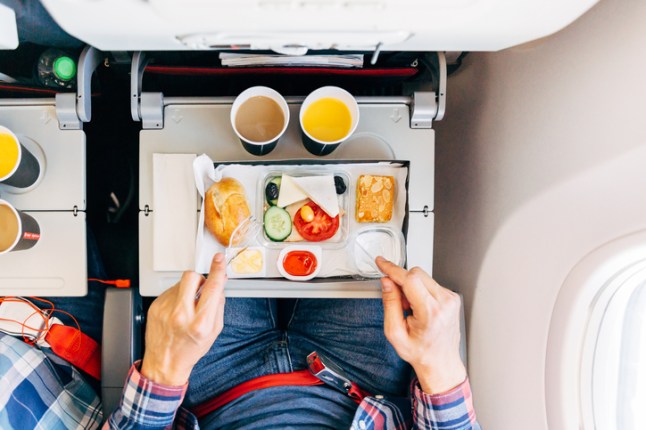
If you’ve got a holiday planned already or are itching to get one booked and need to double-check those baggage rules, we’ve got you covered.
If you can swing the price of a getaway – and there are budget-friendly destinations – often simply being in the airport can strain your finances.
The cost of airport food and drink is higher than the equivalent found in most high streets, and you might prefer to spend your money on some tapas with a view, rather than a sandwich in front of your gate.
So, with that in mind, what are the rules?
Can you take food through airport security?
There is indeed a blanket rule for UK airports when it comes to bringing food through security.

The UK government says: ‘Food items and powders in your hand luggage can obstruct images on x-ray machines. Your bags may need to be checked again manually by security. You can put these items in your hold luggage to minimise delays.’
However, it also states: ‘You cannot usually carry frozen items in your hand luggage, for example liquid, food or ice packs.’
For items such as baby food and milk there are restrictions for carry-on baggage so make sure you double-check before you travel.
But do any companies enforce their own rules?
EasyJet’s rules for taking food on a plane
The easyJet website confirms that you’re more than welcome to bring your own food on board their planes.
The website states: ‘You can bring food into the cabin, although we do sell a range of delicious food and drink on board. There’s a 100ml limit for liquid food, like soup or custard.’
‘Different countries have different regulations about importing food and drink, so make sure you check the rules for your destination.’
While you can bring alcohol bought in the airside departure lounge into the cabin, it must be unopened as you are not allowed to drink any alcohol that’s not been purchased on board the aircraft.

Ryanair’s rules for bringing food onboard
Likewise, if you’ve booked a Ryanair flight, they operate a ‘feel free’ policy – inviting you to bring your own snacks and soft drinks into the cabin.
However, they do have a couple of exclusions – hot drinks and booze.
They say: ‘In the interest of safety we cannot allow passengers to board the plane with hot drinks or consume their own alcohol during the flight.’
They also allow you to ‘bring as much baby milk, powdered milk, sterilised water, and baby food as you need for your flight even if this exceeds the usual limit on liquids,’ and ‘as much liquid medicine as you need for your flight.’

WizzAir’s rules on carrying food on a plane
WizzAir don’t outline any specific rules for taking food on planes so passengers can take food in their carry-on bag as long as it is in solid form.
However, they do highlight that it should be packed securely and not have a strong smell to avoid causing discomfort for other passengers.
They also specify that food and drinks for a baby should be packed in compliance with safety regulations.
British Airways’s rules on carrying food on a plane

British Airways allows passengers to take ‘solid foods like sandwiches, biscuits, fruit, nuts, etc. on board but the same restrictions for liquids apply to liquid foods, e.g. drinks, soups, sauces, jam or jelly’.
However, the website warns that restrictions may apply on food items based on the country of your destination, for example, many countries forbid meat, fresh fruit, and vegetables.
TUI’s rules on carrying food on a plane
The Tui website echoes the government’s advice: ‘Food items and powders in your hand luggage can obstruct images on x-ray machines. Your bags may need to be checked again manually by security. You can put these items in your hold luggage to minimise delays.’
Jet2’s rules for taking food on a plane
The only airline that appears to set their own rules is Jet 2, who state: ‘You may not bring hot food or hot drinks onboard the aircraft. However, we do offer a great selection of food and drinks to purchase during your flight.’
What about taking food on planes in the US?

It’s a bit more complicated when you get to the US as there are different rules for each type of food.
The TSA’s website says: ‘Solid food items (not liquids or gels) can be transported in either your carry-on or checked baggage.
TSA officers may instruct travelers to separate items from carry-on bags such as foods, powders, and any materials that can clutter bags and obstruct clear images on the X-ray machine. Travelers are encouraged to organize their carry-on bags and keep them uncluttered to ease the screening process and keep the lines moving.’
Items you can take in both checked and carry on bags in the US:
- Baby food
- Bread
- Candy
- Cereal
- Cooked meat, seafood and vegetables (no liquids)
- Cookies
- Crackers
- Dried Fruits
- Fresh Eggs
- Gum
- Nuts
- Pies and cakes
- Pizza
- Protein or energy powders
- Salt
- Sandwiches
- Snacks and snack bars
- Spices (dry)
- Tamales
- Tea
However, some items have special instructions that you need to follow for taking them on planes as they might only be allowed in carry-on baggage.
Items with special baggage instructions in the US:
- Alcoholic beverages
- Baby formula
- Bottled water
- Breast milk
- Canned foods
- Cheese
- Chocolate
- Coffee
- Creamy Dips and Spreads
- Fresh Fruits and Vegetables
- Fresh Meat and Seafood
- Frozen Food
- Gel ice packs
- Gravy
- Honey
- Hummus
- Ice cream
- Jam and jelly
- Juice for babies
- Juices
- Live lobster
- Maple syrup
- Oils and vinegar
- Peanut butter
- Pet food
- Salad dressing
- Salsa and sauces
- Soups
- Yoghurt
You cannot take alcoholic beverages over 140 proof in both the carry-on and checked baggage.
The site also warns passengers flying from Hawaii, Puerto Rico, or the U.S. Virgin Islands to the U.S. mainland that they cannot take most fresh fruits and vegetables due to the risk of spreading invasive plant pests.
MORE: European destination asks tourists to ditch phones on arrival
MORE: Mum sparks heated debate over leaving kids in economy
Follow Metro across our social channels, on Facebook, Twitter and Instagram.
Share your views in the comments below.














